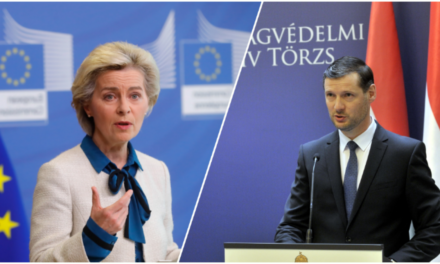"Over the past few days, the number of anti-Semitic incidents across Europe has reached an extraordinary level, reminiscent of the darkest periods in history. European Jews are living in fear again today," the European Commission said in its statement of November 5, 2023. The statement is correct, but the only ones who can do anything about it are the politicians in Brussels and the pro-migration member states, who support migration both in words and deeds and do not act meaningfully against illegal immigration. Most of the migrants are young and middle-aged Muslim men from North Africa and the Middle East, among whom radical anti-Semitism is common, sometimes manifesting itself in actions.
Anti-Semitic attacks and migration
A scientific analysis prepared by the Anti-Semitism Research Center (ZfA) of the Technical University of Berlin reveals that every second immigrant from Islamic-dominated countries has an anti-Semitic worldview. According to the 2022 study by the German Council of Integration and Migration Experts, 11.3 percent of Germans agree with anti-Jewish stereotypes, while among those with a Turkish migration background, this rate was 50.2 percent.
Between 2015 and 2023, 103 acts of terrorism were committed in Europe (the peak was in 2016, right after the migration crisis). Four of the ten deadliest terrorist attacks in Europe between 1980 and 2022 took place during this period (270 deaths in these four attacks alone). The most common destinations are: Belgium, France and Germany. The correlation between the above numbers and the proportion of Muslim communities in the population is clear.
The European countries with the largest Muslim community in proportion to the population:
▪ France: 10%
▪ Sweden: 8.1%
▪ Belgium: 7.6%
▪ Germany: 6.6%
According to a Europol report, all deaths caused by terrorist activity in 2018 were caused by jihadist terrorism. A common form of terrorism affecting Europe is globalized Islamist and jihadist terrorism, which is linked to Muslim religious fundamentalism. An important part of Islamist propaganda is anti-Semitic, anti-Israel hatred, and since the number of Muslims in Europe is increasing through migration, the problem appears here as well.
At the end of 2023, agents of Hamas planning terrorist attacks (against Jews and Israelis) were arrested in Denmark by the Mossad, with the cooperation of the Danish authorities.
The number of anti-Semitic incidents and attacks has been increasing in Germany for years: the number of hate crimes against Jews was 1,799 in 2018, 2,032 in 2019, and 2,275 in 2020 (of which 55 involved physical violence). In 2022, 2,639 anti-Semitic crimes were already registered, of which 88 involved physical violence: that is, the number of anti-Jewish hate crimes in Germany increased by about one and a half times in just four years.
The life of Jews in Germany has changed since 2015, when hundreds of thousands of migrants arrived in Germany from the Islamic cultural area. According to Jewish activist Malca Goldstein-Wolf, "Muslim Jew-hatred is the biggest threat to Jewish life in Germany. There are relatively fewer violent right-wing extremists, but masses of Muslims are not afraid to physically attack Jews who wear kippahs, and they live out their Jew-hatred completely unabashedly. According to the statistics of the authorities in 2023, an average of five anti-Jewish crimes are committed in Germany every day.
In 2022, the number of crimes motivated by anti-Semitism was almost five times as high (2,639) as that of Islamophobic crimes (569), and the use of physical violence is also increasingly common. This tendency was reinforced by the new wave of violence and hatred throughout Western Europe due to the conflict that broke out in the fall of 2023 (between Hamas and Israel).
After the attack by Hamas on October 7, in connection with the situation in the Middle East, the German police registered 1,100 anti-Semitic crimes until December 21 (that is, in just two and a half months - such a large number comes in roughly five to six months based on data from previous years together).
In 2022, there were 1,652 anti-Semitic atrocities in England and 436 in France. According to the British police, the number of anti-Semitic attacks in London increased by 1,400 percent in October 2023, and based on several surveys by the Community Security Trust (CST), a civilian security organization established to protect the British Jewish community, people with a migration background were overrepresented among the perpetrators.
In total, the CST stated that between the Hamas attack on October 7, 2023 and November 22, 2023, it became aware of 1,563 anti-Semitic incidents.
Among the European countries, France has the largest Jewish community, with approximately 600,000 people, and despite this, Jews feel the least safe there, as revealed in a survey conducted by the London-based Jewish Policy Research research institute on behalf of the European Jewish Federation (EJA). too. The study was conducted on the basis of four main aspects, which are: the Jewish community's sense of security, the population's attitude towards Jews and Israel, anti-Semitism and finally the government's performance on the subject, including statistics on anti-Semitic incidents, Holocaust memorials, a budget intended for the safety of Jews, ensuring the freedom of worship and the practice of Jewish customs.
Taking all aspects of the survey together, France ranked 10th out of 12 countries. The first place on the list was Italy, the second was Hungary, while the last place was Belgium.
In 2018, an 85-year-old Holocaust survivor, French Mirelle Knoll, was murdered by her African Muslim assailant, Yacine Mihoub, with 11 stab wounds and then set her body on fire. The trial of the case took place in November 2021, and the perpetrator received a life sentence.
Sarah Halimi, a 65-year-old Orthodox Jewish woman, was broken into in 2017 by her neighbor, 27-year-old migrant Kobili Traore, who first brutally beat her and then threw her out the window while she was glorifying Allah.
Later, the French court acquitted the perpetrator, saying that he was under the influence of drugs at the time of the murder and could not be held accountable and therefore not punishable. On January 9, 2015, the heavily armed terrorist Amedy Coulibaly murdered four people and took seventeen others hostage at the Hyper Cacher grocery store in Paris.
Compared to 2018, the number of anti-Semitic incidents in the Netherlands tripled in 2022, and this only represents the number of cases registered (reported) by the Dutch public prosecutor's office. At the end of 2023, in connection with the conflict in the Middle East, the Islamic State called for new terrorist attacks in the countries of Europe. According to the German Constitutional Protection Office, jihadists in Germany are linked to al-Qaeda and the Islamic State, using the conflict in the Middle East.
Extreme cases following the Hamas attack:
- In Lyon in November 2023, a Jewish woman was stabbed in her home. Authorities said they found a swastika painted on his door.
- In Berlin in October 2023, Molotov cocktails were thrown at a synagogue and a Jewish community center. At the same time, a Star of David was painted on the walls of several Berlin houses (the police launched an investigation for inciting hatred).
- One month after the outbreak of the conflict in the Middle East, the Jewish section of Vienna's largest cemetery was set on fire.
According to some expert opinions, far-right terrorism, which is fueled by mass migration, may become stronger in the future: they will be able to attack both Jews and Muslims. There is a danger of escalation of atrocities and gross physical violence (even involving terrorist phenomena).
In the first 4 months of 2023, the number of illegal border crossings in the European Union increased by 30 percent compared to the same period in 2022. After the downturn following the outbreak of the Covid epidemic in 2020, roughly 130,000 illegal border crossings took place at the external borders of the EU, but this number rose to over 200,000 in 2021 and over 330,000 in 2022.
According to Frontex data, more than 355,000 people entered Europe illegally last year, which is the highest figure since 2016.
The political leadership in Brussels bears a serious responsibility regarding the direction in which the migration challenge affecting Europe (and the resulting extreme social phenomena) has turned not only in the past months, but in the entire past decade. In addition to extreme Islam and migration, even the woke ideology can incite anti-Semitism with the view that it promotes racial justice (according to African-American writer Chloe Valdary, the woke movement is an "aggressive, performative approach to progressive politics that only makes the situation worse" )
Pro-migration that strengthens anti-Semitism
The responsibility of the Western and Brussels political leaders is basically based on the fact that they called in/let in the migrants, openly support immigration, and the Western governments do not allow the state authorities to act decisively against the pro-Hamas and anti-Semitic communities/protesters.
In October 2023, a Star of David was painted on the walls of several houses in Berlin, in connection with which German politicians paid extra attention to not blaming migrants, illegal immigration and current political events for the situation, but at the same time they consistently referred back to Germany's National Socialist past and repeated that their country cannot return to this path.
Chancellor Olaf Scholz said that the increased riots are terrible, which must be dealt with decisively, but he did not elaborate on the Star of David paintings and did not mention migration as the real cause/root of the problem. Unlike Scholz, Dirk Wiese, SPD deputy faction leader, was one of the few German politicians who specifically addressed the fact that stars of David were blown on certain houses, but he did not link immigrants to what happened either.
The example of the first immigrant party to reach parliament, the Dutch DENK, clearly shows how the unsuccessful integration of migrants contributes to the spread of anti-Semitism, which was previously firmly rejected in the EU. In 2017, a leader of the DENK spoke in the Dutch parliament about the "long arm of Israel and the Jews", referring to Jewish organizations in the Netherlands, and the party then started a campaign against the "Israeli lobby". As part of this, the post appeared on the party's official Facebook page, in which a man wearing a kippah shakes hands with a figure in a top hat, referring to the harmful cooperation between Jews and the capitalist elite, according to the DENK.
In 2017, Hungary was attacked with anti-Semitism because of the posters about the Soros plan, while the Hungarian government was arguing against mass migration with the posters, which produces immigrant parties, and the new, 21st century. century European anti-Semitism.
DENK received more than 200,000 votes in the 2017 and 2021 Dutch parliamentary elections, as well as 7 percent of the votes in the 2018 municipal elections in the two largest Dutch cities, Amsterdam and Rotterdam.
The French immigration law was passed in December 2023, which would continue to flood France with migrants. Éric Zemmour put it this way: "Just like the twenty-nine laws that preceded it in the last thirty years, the law passed on Tuesday night will not be able to curb migration to France." The law does not abolish it
- citizenship by birth;
- family reunification or family immigration;
- nor the health insurance or social benefits of non-European foreigners (precisely the two benefits that constitute a significant driving force of migration).
The law also does not allow the deportation of criminals and persons with dual citizenship on the S-list. The S-list contains those criminals who can be linked to terrorism, who are at large and can take up work. In principle, they are under close observation, but practice has shown that this is not the case at all. They are extremely dangerous, radical Islamists, their number can be estimated at more than 20,000, of which 4,000 are at the top of the list of dangerous persons. Several of them are connected to the terrorist organizations Hamas or Hezbollah. Since this data is rarely made public, we can rely on a 2015 data.
The law affects Algerians, as the country's citizens continue to enjoy migration privileges granted in the 1968 agreement. Thus, 100,000 foreign students, 150,000 asylum seekers and 100,000 family immigrants are still admitted annually (by law). In the future, 500,000 new foreigners may set foot on French soil, and all with the blessing of the immigration law.
Changes must be made and those responsible must be named
Anti-Semitic attacks deserve special attention because they doubly damage the Jewish community. Physical and mental injuries to the direct victim can have lifelong consequences, but they also terrorize other members of the community. "Terrorizing" is the right word, because anti-Semitic attacks against family members, friends, and even community members we may not know personally create fear and change behavior.
Data from surveys of European Jewish communities show the extent of the impact. Already in 2018, the Fundamental Rights Agency of the European Union conducted a survey among Jews in 12 European Union member states. They found that 40 percent were worried that they would be physically abused in the next 12 months. Due to concerns about their safety, 34 percent of those surveyed said that they avoid visiting Jewish events or locations at least occasionally. More than 70 percent of Jews avoided wearing or carrying anything that could identify them as Jewish, and 38 percent also admitted that they had considered leaving their country for security reasons in the past five years.
These figures are shocking in themselves, and the trends continue to worsen.
Parents in the still-existing but ever-shrinking Jewish communities of Western Europe should not have to tell their children not to take to the streets for their own safety when rockets fly thousands of miles away in a conflict in which they may have a stake but play no role.
As recent reports from the UK and France make abundantly clear, this simple, understandable expectation is far from the current reality. No one should consider the status quo an acceptable state of affairs. This is a moral outrage that Europe must address immediately.
Meanwhile, according to the website of the Israeli newspaper Yediót Ahronót, Hungary has the largest number of Jewish descendants after Israel. In our country, people of the Jewish religion face discrimination, physical or mental abuse, or are restricted in the free exercise of their religion because of their religious beliefs. XV of the Basic Law. guarantees that no one can be discriminated against (among other things) due to their color, gender, religion, or any other opinion or other situation during the exercise of their fundamental rights. This provision conceptually makes the systemic, "state-recognized" presence of anti-Semitism, anti-Gypsyism and homophobia impossible.
Earlier, Slomó Köves, the chief rabbi of the United Hungarian Israelite Community (EMIH), said the following at an international conference organized by the Friends of Hungary Foundation: "Hungary is probably the safest place for Jews in Europe right now." He noted: "As far as anti-Semitic tendencies are concerned, Hungary is definitely safe in international comparison."
Source: alaptorvenyblog.hu
Cover image: Photo: Jaroslav Šmahel / Pixabay













